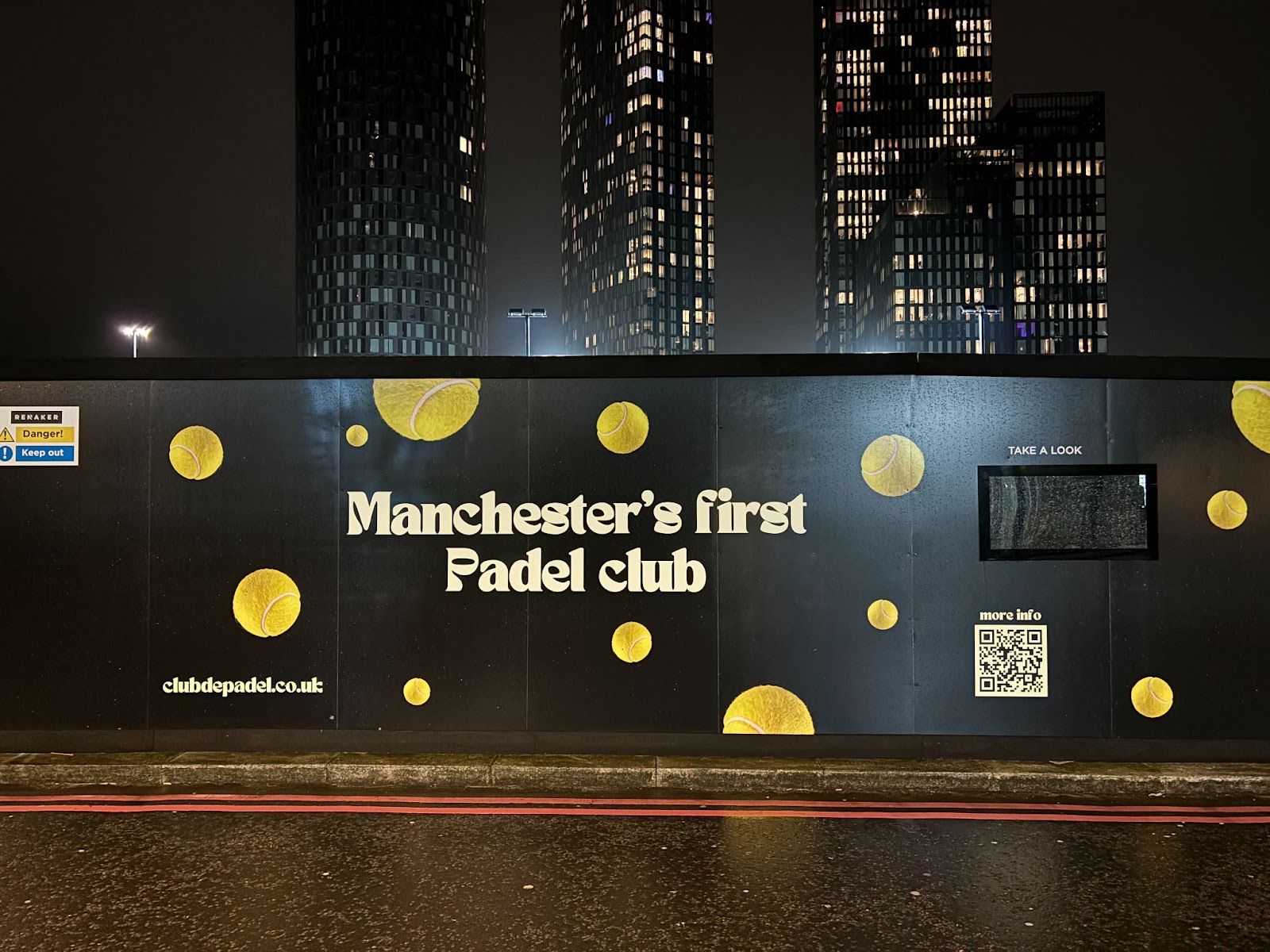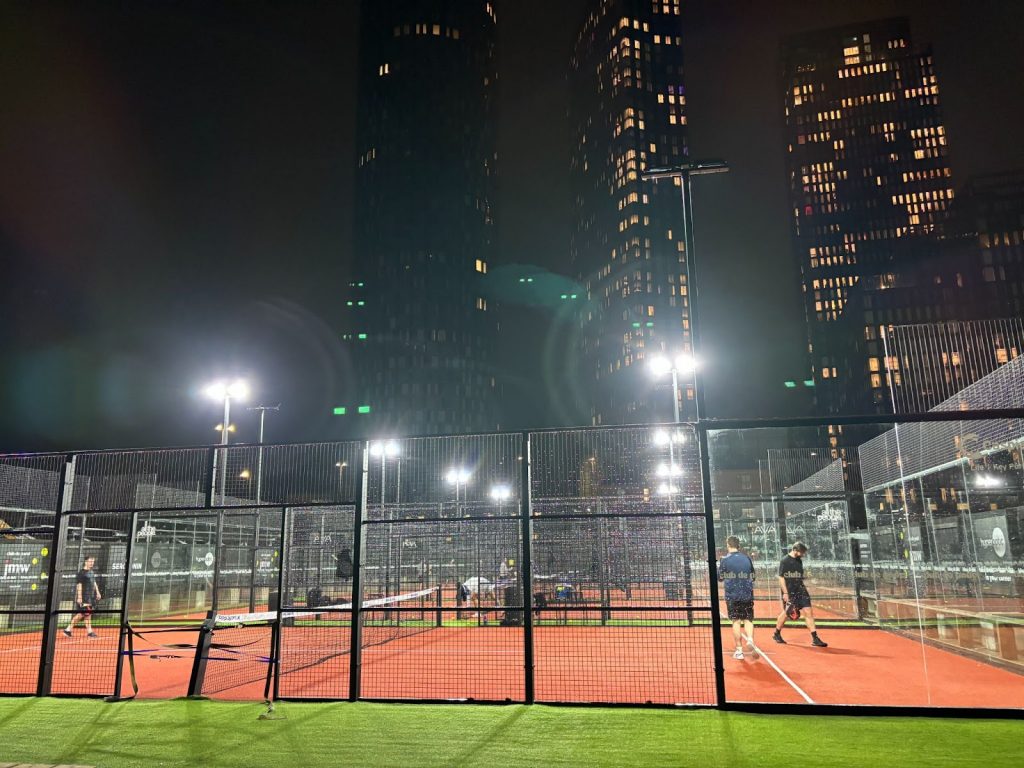
Manchester has seen unprecedented demand for increasingly popular Mexican racket sport, padel, following the opening of its first dedicated venue.
Within six weeks of Club de Padel’s launch in emerging neighbourhood New Jackson, almost 4,000 players have picked up a racket in front of the towering Deansgate skyline.
Padel, a racket sport founded in Mexico in the 1960s, has seen a boom all across the country. In 2019 there were only 6,000 active players in the UK, and 115 courts. There are now over 300 courts and an estimated 90,000 players. The LTA expects those figures to rise to 1000 courts and 600,000 players within the next three years.
David Blake, 37, who founded the club alongside friends James Wigglesworth and Matt McKinlay, said: “It’s gone absolutely bonkers. We’re selling out on Tuesdays and Wednesdays in January. We didn’t think we’d get to that point until it got warmer.”

In recent years padel facilities have sprouted up across the North West, with famous tennis venues, such as The Northern, opening courts. But Club de Padel is the region’s first padel-only venue.
Blake says there’s already enthusiasm for more venues: “We’ve only been open for six weeks and [businesses] are already coming to us to open more.”
“We’ve also been approached about opening in other cities.”
Despite the enormous growth of padel in the UK in recent years, Manchester was late to the party.
Alberto Cubero Torregrosa, 32, is the head coach at Club de Padel. Having moved from Malaga to pursue a career in architecture in 2019, he became Manchester’s highest ranked player.
Alberto, a 25-year padel veteran, saw limited opportunities to play his beloved sport in his new home.
“When I moved to Manchester I started competing around the UK,” he said. “But I was the only person from Manchester.
“In Manchester we didn’t even have padel courts. When I wanted to play padel I was travelling to Huddersfield, Middlesbrough, Derby, London. I did some coaching in Harrogate too.”
The Spaniard has continued to work as an architect alongside his new role at the club. But padel has now become a profession as well as a hobby for Torregrosa.
The head coach is not the club’s only Spanish connection. Blake first discovered padel while on holiday in Barcelona.
“Me and my wife, who is also a co-owner, were going out for dinner. I saw what I thought were tennis balls, and I saw the metal and the glass and thought ‘this isn’t tennis’,” he said. “I’ve always loved racket sports but I thought I’d played all of them. I was transfixed.”
Padel is immensely popular in Spain. There are more than 20,000 courts and six million players. It is only second behind football as the most played sport.
Having witnessed padel fever abroad, Blake said: “We just thought Manchester is such a globally famous sporting city, how can it not have somewhere to play the fastest growing sport in the world.
As well as providing a space for skilled padel players, the Deansgate venue is also attracting beginners, many of whom take part in weekly classes. The ‘Padel One’ course, which teaches new players the basics of the sport, sold out almost immediately.
Tom, 27, is a first-time player: “I heard a few of my friends talking about this place, I thought I should give it a go. It’s a good way to socialise. I get the tram into Deansgate. It’s a great location everyone.”
The central location of the club has attracted local workers.
James Wallbank, 47, added: “It’s the second time I’ve played and I really enjoy it. I work just around the corner and I’m hoping to come down again. I can see people playing from my window at work.”
“I play other racket sports, but squash is a bit too hard. I’m not getting any younger so I want to get some good exercise and have fun at the same time.”
Blake explained that Manchester’s notoriously wet climate meant building the courts took longer than expected. But perpetual rain has not kept players away.
James added: “People were playing in the rain earlier even though it rained really hard.”
Padel has become a hit in Manchester, but the next challenge will be transforming it from a social to a more professional pursuit.
Alberto said: “At the moment you cannot just live as a padel player and you have to combine earning money as a coach because prize money is not that high. But I am confident with the sport growing, maybe we can have British players playing full time in five years.
“The national federations are working on it. I am confident it will be an Olympic sport.”
Squash, a similar racket sport, has been added to the Olympics in 2028 for the first time and with padel’s growing popularity worldwide, there is hope that one day it could be added to the Olympic roster
Blake, too, is hopeful of padel’s future Olympic status: “I don’t see why it shouldn’t be. There are enough countries playing it now and it’s huge in the Americas, in Europe, in the Middle East. We have players here from Kuwait, Qatar, and Saudi Arabia.”
For now, the increasingly global sport is making its mark in Manchester.
